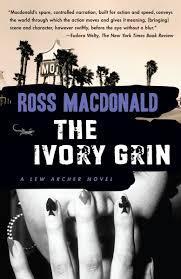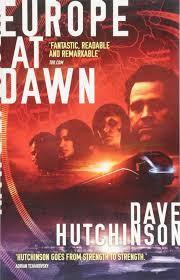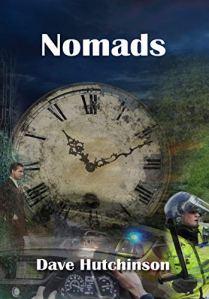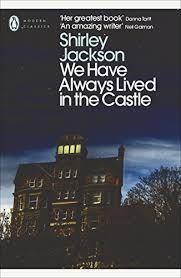So, here’s my February roundup as recently promised. February was an intense month at work and I read very little. On the other hand, I did enjoy what I read, so overall still a win I think.
The Ivory Grin, by Ross MacDonald

My return to Ross MacDonald was long overdue, and The Ivory Grin did not disappoint. Lew Archer is hired to find a missing girl, Lucy. Lucy is black and Archer’s client Una is white. Perhaps that’s why Una figures Archer will buy her story that Lucy was her maid and stole from her, and she’s only looking for her to avoid getting the police involved and the girl in trouble.
Soon Archer finds he’s not the only PI on Lucy’s trail, and when he finds her she’s evidently terrified. She’s right to be, because we’re hardly into the book at all when Archer finds Lucy with her throat slashed and in her effects a newspaper clipping about a missing socialite and a $5,000 reward.
MacDonald is on top form here. There’s a great character in the form of jaded police chief Lieutenant Brake, who’s seen it all before and is all too keen to arrest Lucy’s boyfriend figuring getting a jury to buy that one black person killed another won’t be too much of a hard sell. The difficulty is, Archer doesn’t believe the boyfriend is guilty, and Brake is smart enough to have his own doubts.
Ivory Grin has believable characters, a satisfyingly tangled plot, and definite pace. It’s an easy but excellent read. Jacqui reviewed it here, and I agree with pretty much every word of her review (particularly how great Brake is as a character, but then psychological depth is often where MacDonald excels).
Europe at Dawn, by Dave Hutchinson

This is the slightly unexpected fourth book in Dave Hutchinson’s Europe trilogy (now I guess a tetralogy – my previous reviews are here, here and here). It sees a welcome return of Rudi and Rupert, both much liked characters from earlier novels, and is satisfyingly complex while still revealing a few more of the setting’s secrets.
One reviewer on Amazon suggested re-reading the earlier books before reading this one, and to be honest I can see why. This is the culmination of three previous novels of future-Europe spycraft and most of the characters lie constantly to each other. I can see myself returning to the full cycle and reading them in again in reasonably quick order, as I’ve done with some of William Gibson’s books. I think they would repay the effort.
Ultimately, I didn’t actually think Hutchinson’s Europe trilogy needed anything more said, and to an extent I still think that, but Hutchinson clearly disagreed and since I thoroughly enjoyed Dawn I’m glad he did.
Nomads, by Dave Hutchinson

This came out while I was reading Europe at Dawn, and I needed a short SF read while very much heads down at work. I normally avoid reading two books by the same author in a row, but Nomads is a novella so I made an exception.
It’s a contemporary tale of a rural policeman who goes to investigate a cottage whose occupants complain that Cary Grant tried to break in the previous night. From there, things get very weird indeed, with time travel, refugees from the future, and a distinctly irked Home Office all thrown into the mix.
It’s fun, but I actually think it would be better if worked up into a full novel. If Hutchinson ever does that I’ll read it. If not, it’s a fun light snack between meatier books.
We Have Always Lived in the Castle, by Shirley Jackson

What to say? It’s in Penguin Classics for a reason. It’s a masterpiece of expertly written gothic not-really-horror-but-still-pretty-damn-uncomfortable.
Merricat, Mary Catherine Blackwood, lives in a large house with her sister Constance and their frail Uncle Julian. Theirs is an old and a rich family, but blighted by scandal after all but these survivors were murdered in a notorious poisoning case some years before. Everyone believed Constance was guilty, but she wasn’t convicted so now the three of them live up in their secluded house, famous and feared.
Constance never leaves the house or its grounds now, and Uncle Julian can’t, so it’s Merricat who goes into the village for their shopping. She hears the chants of the local children, sees the barbed looks of the villagers. The thing is though, some of it is clearly real, but some of it might be entirely in Merricat’s head. She’s a marvellously unreliable narrator, and while many of the villagers clearly do hate and fear her I couldn’t help noticing that at times Merricat ascribed hostile motives to what seemed entirely ordinary acts on their part.
Merricat is superstitious, prone to fantasy, a dreamer but incredibly proud of her family and the Blackwood name. Then comes the bullishly pragmatic Cousin Charles, arrived to gain access to Merricat’s father’s money and soon dividing the household. He woos Constance, plans to have Uncle Julian put in a home, but in Merricat he’s found an enemy quite beyond his comprehension. It’s an insane fairy tale, with Merricat as the not-so-innocent babe and the unsympathetic Cousin Charles really very far out of his depth as the wicked interloper.
It is brilliant. It is funny. It is dark and twisted and gothic and surprising and, well, I could go on. Did I mention that it’s brilliant? A definite for my end of year list.
Jacqui wrote a very good review of this here. I also previously wrote about Jackson’s The Haunting of Hill House (also excellent) here. Hill House is remarkable. I think this may actually be better, hard as that may be to imagine.
And that was it for February! I did say it was a light month for reading. Still, that Jackson. Extraordinary.
